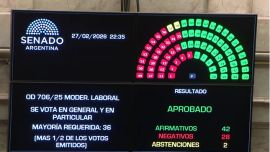China's public health authorities reported Friday that there are 9,692 confirmed cases of pneumonia caused by the new coronavirus 2019-nCoV nationwide as of Thursday's close, with a total of 213 deaths from the disease.
Set against this backdrop, Russia announced that it will close its 4,250-kilometre border with China to help slow the advance of this new strain.
The disease started in the Asian country and has already spread to other countries in the Asian region. Within Europe, there are already three countries that reported people infected: France, Germany and Finland.
The disease has also spread to other continents further afield, such as Oceania (Australia) and the Americas (Canada and the United States).
‘No Argentine cases’
Health Minister Ginés González García held a press conference on Thursday, January 30, in which he referred to outbreak. Earlier this week, he World Health Organisation (WHO) declared that the outbreak of the virus in China "has become a public health emergency of international importance.”
"We are in constant contact with the WHO. There are no cases in Argentina. The number of cases is 7,800 but 99 percent of the cases are in China. Or people who have been to China," affirmed the Minister.
The national official assured that "there are no different circumstances" with respect to the country's situation with respect to the virus.
"We took different measures, the first was to meet with a committee of experts," he uttured at the conference, where PERFIL was present. He also indicated that an update on the epidemiological situation was made, recommendations were given to the health team.
"We have prepared the laboratories to identify a possible case. There was a meeting with immigration, customs, the ministry of foreign affairs and agencies within airports," Gonzalez Garcia added.
In relation to the number of infected, he mentioned that "there are 12 Argentines in Wuhan who are in quarantine and in the other cities, we know that they are all well. We advise, if it is not imperative, not to travel to China," he recommended.
Virus features
At present, it is not possible to determine the exact mortality rate of the new coronavirus, because the actual number of people infected is unknown.
However, that rate "is today clearly less than five percent," judged French Health Minister Agnes Buzyn.
Only two fatal epidemics were previously caused by the vast family of coronaviruses: SARS (Severe Acute Respiratory Syndrome) and MERS (Middle East Respiratory Syndrome).
According to the WHO, the SARS epidemic left 774 deaths worldwide out of 8,096 cases in 2002/2003 before being contained, i.e. a mortality rate of 9.5 percent.
The MERS epidemic, still ongoing, left 858 deaths out of 2,494 cases since September 2012 (mortality rate of 34.5 percent).
The new virus "is less deadly than SARS and MERS. But it seems more contagious," according to Buzyn.
The number of people infected by an infected patient, called the "base reproduction rate" or R0, is important in determining the dynamics of an epidemic, and scientific estimates range from 1.4 to 3.8, moderate figures, explained David Fisman, a professor at the University of Toronto.
False Alarm
A Chinese woman presented herself this week at the "San José" Interzonal General Hospital of Acute Diseases, in Pergamio, province of Buenos Aires, with fever and muscular pain.
Faced with the symptoms, the health center authorities activated the protocol for cases of Coronavirus.The alarms were set off because, according to the local site Primera Plana, the patient traveled with her husband to their country weeks ago.
In this context, the dome of the hospital ordered a series of clinical analyses and hours later confirmed that it was a case of the flu.
"The tests do not allow us to interpret that this is a case of Coronavirus," explained the hospital to the media front page.
In addition, a permanent control on the patient in her house was arranged, which is in charge of the central Epidemiology area, through a medical specialised in infections.
The application of the protocol was mandated by national regulations, but they clarified that "all health and epidemiological alert measures" are in place so "no alarm should be generated.
- TIMES/PERFIL




















Comments